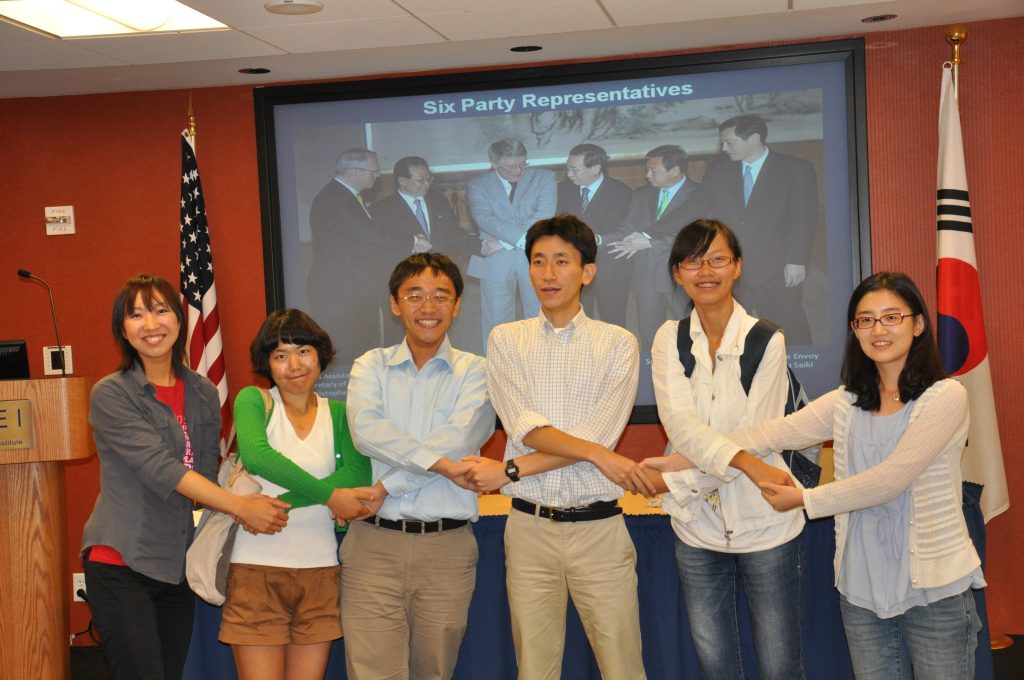The first annual Institute on U.S. Foreign Policy for East Asian Student Leaders took place from
August 1 – September 4, 2010. The Institute welcomed twenty students from China, Japan, and Korea to study American foreign policy in Washington, DC.
The curriculum was designed to enhance students’ understanding of the historical underpinnings of U.S. actions abroad and to empower them as leaders through experiential learning. Students engaged in an intensive four-week program of classroom lectures, panels with policymakers, community service activities, and cultural experiences. The program included a rich curriculum of contemporary and historical readings on American policy and cultural history. It further challenged students to apply this background knowledge to analyze contemporary challenges affecting both the entire globe and East Asia in particular. Students benefited from lectures and discussions with a dynamic group of foreign policy leaders and scholars, including experts on China, Korea, Japan, and East Asian relations.
Leadership development programming, community service activities, and field trips were interspersed throughout. Students rounded out their stay in the US with a six-day study tour to Ann Arbor and Grand Rapids, Michigan and San Francisco, California, where they attended additional lectures related to the Institute themes. Participants in the institute continue to maintain contact through an alumni network and are encouraged to collaborate on future regional initiatives.
The Study of the US Summer Institute on US Foreign Policy for East Asian Student Leaders is sponsored by the US Department of State Bureau of Educational and Cultural Affairs.
Curriculum
Dr. Amy Searight, the Summer Institute 2010 Academic Director, has previously led several academic programs for the Elliott School of International Affairs at George Washington University. She was also Director of the Master of International Policy and Practice (M.I.P.P.) program for mid-career professionals at the Elliott School from 2006-2008. Dr. Searight is currently Adjunct Fellow with the Japan Chair at the Center for Strategic and International Studies (CSIS) and Adjunct Professor at the Elliott School of International Affairs at George Washington University. She is a specialist in Japan, Asian regionalism, and international trade and financial relations. At CSIS she is coordinating director of a MacArthur Foundation project on Asian regional cooperation on non-traditional security issues. In 2003-2004 Dr. Searight served in the U.S. Department of State on the Policy Planning Staff and as Special Advisor to the Ambassador for Asia Pacific Economic Cooperation. She has traveled and conducted research extensively in Northeast Asia and speaks fluent Japanese.
The textbook for this summer will be Special Providence: American Foreign Policy and How It Changed the World by Walter Russell Mead, a senior fellow at the Council on Foreign Relations. In this book, according to a Publishers Weekly‘s review, Mead describes four contrasting schools of foreign policy: a “Hamiltonian” concern with U.S. economic well-being at home and abroad; a “Wilsonian” impulse to promulgate U.S. values throughout the world; a “Jeffersonian” focus on protecting American democracy in a perilous world; and a bellicose, populist “Jacksonian” commitment to preserving U.S. interests and honor in the world.
Each participant will be provided with a copy of this book.
While the curriculum for this summer institute is still under development, these are some of the topics that are planned for lecture and discussion.
Who Makes American Foreign Policy? Key Actors and Institutions
- Perspectives from a Former Congress Member: The Changing Politics and Foreign Policy Role of Congress
US-Asia Relations
- US-Asia Policy in the Progressive Era
- Isolationism, the Great Depression, and the Rise of US as a World Power
- The Changing Role of the U.S. in World Affairs and Asia – From Isolationism to World Power
- US-Japan Relations through Japanese Socioeconomic and Political Change
- Political Dynamics and Current Challenges in the US-Japan Alliance
- Peace and Security on the Korean Peninsula
- Was Korea a Proxy War?
- Student Simulation: Simulation: North Korea and the Six-Party Talks
- A Rising China
- The Politics of Climate Change in the U.S. and Asia
- Asian Communities in America
- Historical Grievances and Reconciliation in East Asia
Historical US Foreign Policy
- The Founding Fathers
- The Battle at Gettysburg Field Trip
- The Jacksonian Tradition: From Spanish-American War to 9-11 and Iraq
- America in the Reagan Years
- Revolutions in Eastern Europe, the Fall of the Berlin Wall, and the Collapse of the Soviet Union
Economics and Foreign Policy
- The Evolution of the International Trade Regime
- Economic Interest Groups in Foreign Policy
- The Great Depression and the Current Global Financial Crisis
Humanitarianism and Foreign Policy
- Idealism and Morality in US Foreign Policy
- Foreign Assistance and Humanitarian Aid
- Religion and Foreign Policy
- Community Service Overseas: Panel Discussion with Former Peace Corps Volunteers
The Role of Media in Foreign Policy
- The Media, Johnson and the War in Vietnam
- Misperceptions, the Media, and the Iraq War
Current Events
- Post- 9/11 Changing Paradigms in National Security Policy
- Student Debate: the War on Terror
Discussions with Policy Leaders
- Career Diversity in the US Foreign Service: Discussion with State Department and Asian Foreign Affairs Association (AAFAA) Members
- Conversations with Diplomats: Behind Embassy Walls
- Ambassador’s Forum: Discussion with Former US Ambassadors to China, Japan, Korea
Field trips will likely include:
- The U.S. National Archives (The Declaration of Independence and Constitution)
- U.S. Library of Congress
- The U.S. Capitol Building
- The U.S. State Department
- The U.S. Holocaust Museum
- The Newseum
- Gettysburg Battlefield (U.S. Civil War)
- Mount Vernon (home of President George Washington)
- Monticello (home of President Thomas Jefferson)
- University of Virginia campus


